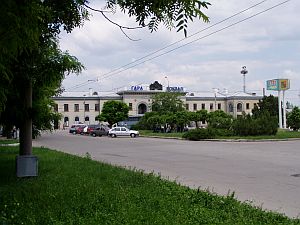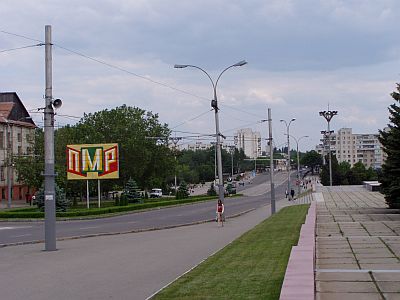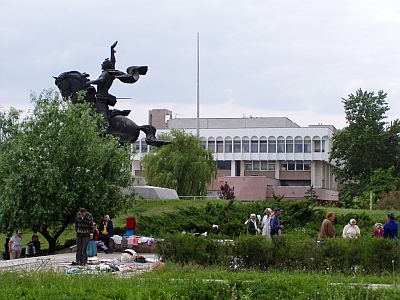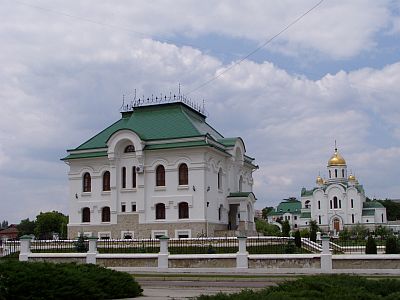Official Name
Тирасполь (Tiraspol'). That is the Russian and most common name of the town. The Ukrainian name is Тираспіль (Tyraspil'), and the Moldovan name, written with Cyrillic letters, Тираспол (Tiraspol). [ Tiras ] is the old Greek name of the river Dniestr. [ -pol ] is also Greek and derives from the word "Polis" which simply means 'town' (as in Acropolis). Quite weird that this town, founded in the 18th century, has a Greek name...
Location

| ||
| Tiraspol |
Tiraspol stretches along the river Днестр (Dniestr). The Dniestr meanders south of the town before the river flows direction Black Sea. The Moldovan capital →Chişinău is around 65 km away, the port city of →Odesa less than 100 km. The border to the Ukraine north and east of Tiraspol is less than 10 km away.
Population
Tiraspol has around 185,000 inhabitants, making it the largest town of the →PMR and the second largest town of the →Republic of Moldova.
Orientation
In contradiction to many other towns in the former Soviet Union, almost no place name has been changed: ul. Kommunisticheskaya, ul. Sovietskaya, ul. Mira (Peace rd) etc - everything is still there. The main train station is a bit away from the city centre and marks the end of ул. Ленина (ul. Lenina, ul=street). All buses to Tiraspol run to the square in front of the train station, but before they stop in the centre of town, too. There's an exchange booth in the train station, but the rate is worse than in exchange booths in the centre. Follow Lenin rd from the train station, and you will soon pass the large and beautiful парк им. Кирова (Kirov Park). As in many other Soviet towns, the layout of streets forms a perfect grid, making it almost impossible to get lost. Lenin rd leads straight to the ул. 25 окт. (ul. 25 October), which is the long main road of the capital.

| ||
| The small train station of Tiraspol |
All the important museums, administration buildings and other attractions line up along this street. In the centre of town, the 25 October street crosses пл. Конституции (pl. Konstitutii, Constitution Square) featuring a Suvorov-Monument and a rundown Palace of Culture. When you walk left from there, you will soon get to a small bridge spanning the river Dniestr. Further to the west, there's the Presidential Palace, the building og the Supreme Soviet and so on. If you continue walking westwards, you will enter the long suburbs of Tiraspol with spacious residential areas. There aren't many historic buildings in town. However, there's definitely no lack of monuments. The streets are surprisingly clean and there isn't much traffic.
Getting there / transportation
Tiraspol is easily accessible by bus and by train from →Chişinău and the →Ukraine. There are also several direct buses to →Gagauzia and →Bălţi. For more information on how to get to Tiraspol see →Getting there: PMR. Old trolleybuses run along 25 October street. Line No 1 and 19 run all the way to →Bendery. The fare is 0.7 Rouble (€ 0.06), to be paid on the bus. Halfway, you can see the brand new Sheriff-Stadium on the right side (when coming from Tiraspol).
As a result of the Russian-Turkish war between 1787 and 1791, Russia added the →Crimea and a part of Bessarabia to its vast territory. Now it was necessary to colonize the new areas. General А.В. Суворов (A.V. Suvorov), today the national hero of Transdniestr, decided to built a fortress in present-day Tiraspol in 1792. Soon, a town developed around the fortress. Since Tiraspol marked the edge of the Russian empire, many wars struck the strategically important town. In the year 1918, Tiraspol was occupied by →Romania, but two years later it was recaptured by the newly founded Soviet Union. Between 1929 and 1940, Tiraspol was the capital of the МАССР (MASSR) (see →History of the PMR). From 1941 to 1944, the town was occupied by Nazi Germany's Wehrmacht. In the year 1989, Tiraspol was the centre of the secessionist movement. One year later, it was declared capital of Transdniestr aka the PMR. The town itself was not attacked during the short independence war.

| ||
| 25 October street - the main street of Tiraspol |
The main street of Tiraspol is very long and offers some of the best shops of the country. But there are only a few shops compared to other cities. The atmosphere is a little bit strange, because there aren't many people in the streets and there's not much traffic. But it's quite clean. The town itself is spacious and has a lot of green. Large memorials characterize the centre - they are mostly dedicated to the victims of the Soviet Afğānistān adventure and the fallen heroes of the short war in 1992. Of course there's also a Tomb of the Unknown Soldier and an Eternal Flame etc. Large banners and hoardings remind the visitor where he is: In the glorious Pridniestran-Moldovan Republic. But there's even capitalist product advertisement here and there.

| ||
| Suvorov-Monument and the presidential palace |
Opposite the Presidential Palace (which doesn't look like a palace at all) on Constitution square, visitors are going to face the harsh reality of this country: Below the Horseman Statue of General and founder Suvarov, within sight of the presidential office, mainly old people are desperately trying to sell the shirt off their back. The things they offer, most of it are household items, are completely valueless and can bring in a few kopekes only. What a sad view.

| ||
| Recently restored church in Tiraspol |
There aren't only communist monuments in town - there's also a beautiful, obviously newly restored church right in the centre of town. Although the country is ruled by communists, the people aren't really atheistic. Coincidentally I witnessed a service in a church in Bendery, and the church was full of people. There's also a Drama Theatre in Tiraspol. Thanks to the fact that the entire industry of Tiraspol is located outside the city centre, it's quite a pleasant town. The residential areas, mostly stretching along the road to Bendery, look a little bit drab but still better than expected. There are many soldiers of the PMR army in the streets - some of them completely wasted.
Only a few kilometres to the west, there's the small town of →Bendery, which became the main battlefield of the war in 1992. It's also worth a short stopover.
In the centre of town, there's the hotel Дружба (Drushba, Friendship). The hotel has the typical two-tier price system, but as far as I've heard it's still very cheap for foreigners. Before checking in, foreigners have to register with the local police.
If you want to know what a canteen was like in the former Soviet Union, you should head for Кафе Чудесница (Cafe Chudesnitsa) (Café Wonderful!?). The interior of the self-service cafeteria is dark and old-fashioned and nothing seemed to have changed during the last decades. A lunch meal for two persons including soft drinks set us back less than € 1. Staff there was extremely friendly. You will find this interesting place near the post office on 25 October street. The name is written in Russian only.
- www.city-tir.idknet.com The official website of Tiraspol - unfortunately in Russian only.
- www.greatestcities.com/Europe/Moldova/Tiraspol_city.html A few lines and some links about Tiraspol. English.
Do you have or do you know a good website about Tiraspol? Don't hesitate, let me know! After checking it, I would love to add it to the link list. You can submit a link by using the →contact form. Note that commercial websites will be treated differently.
nabil wrote:
please please please
does somebody have a map of tiraspol ?
thank you !!!
Posted by nabil on August 31, 2008 08:22
tabibito wrote:
Check this - you'll find some maps there:
Visit PMR
Posted by tabibito on September 3, 2008 01:55
©2024 Europe-East.com

 Albania
Albania (Transnistria)
(Transnistria)